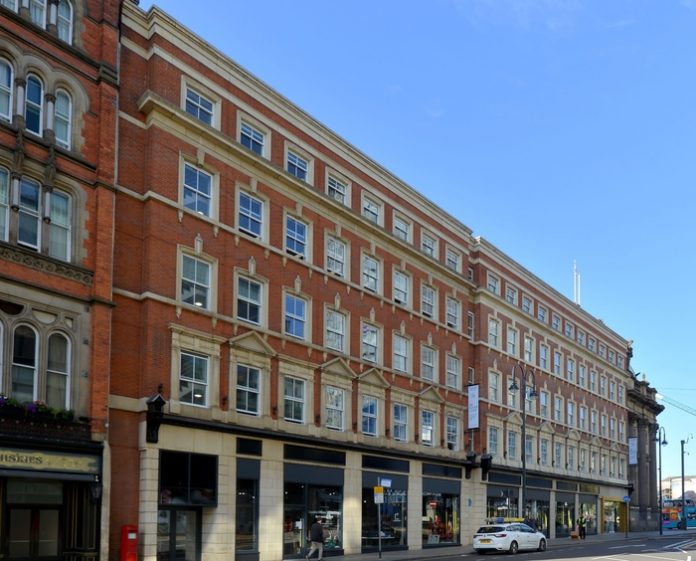Eamon Fox, partner and head of office agency at the Leeds office of global property consultancy Knight Frank, commented: “There is no doubt that 2020 is going to be an exciting and productive year for the office market in Leeds.
“The headline rent of £30 per sq ft was reconfirmed in a number of lettings in 2019. Knight Frank have a number of significant lettings in legals at £32 psf, which will be publicised in the first quarter of the year. We expect £34 psf to be achieved by the end of 2020.
“There are a number of developments to watch. Globe Square and Kings Court, the offices recently vacated by law firm Walker Morris, will be two schemes in the news. Kings Court will change hands soon, with the new owners planning a redevelopment of scale and quality.
“Award-winning CEG are likely to take forward the first building in Temple, which will see offices delivered in 2021. Meanwhile 34 Boar Lane, the prime mixed-use building transformed by developers Kinrise, will see a number of high-profile lettings this year.
“Channel 4’s move to Rushbond’s flagship Grade II listed office building Majestic in City Square has really put it on the map. There are still three floors of the six-storey building to let, and, not surprisingly, there is serious interest in these.
Mr Fox added: “Despite the ongoing Brexit talks, we are still seeing many businesses pressing ahead with expansion or relocation plans. This is against a backdrop of a severe lack of options and an office development pipeline that continues to be raided by early movers, which is why we are forecasting continued rent rises over the next three years.
“It is also relevant to note that Prime Minister Boris Johnson is planning a big shift of civil servants out of London this year as part of his aim of “levelling up” opportunity and spreading wealth across the country. This could have major consequences for Leeds.”
Richard Heslop, owner and MD of leading West Yorkshire property consultancy DE Commercial: “Now that the political uncertainty is over, following the decisive General Election result, I expect a bounce within the commercial property sector in Yorkshire next year. The debate over Brexit and the threat of punitive taxation under a potential Labour government was holding everyone back – now developers and investors are ready to crack on with projects in the region. Confidence will return to the market. I am currently already working on a couple of investment deals, which should be completed by the first quarter of next year
“I believe there will now to be return to speculative development in the industrial property warehouse sector in Yorkshire, especially West Yorkshire, where demand currently well outstrips supply. We have already been approached by a developer looking to build out up to 20,000 sq ft in the first phase of warehouse/industrial space immediately upon receipt of detailed planning permission. There is every reason to be cheerful about next year – the fundamentals are in place for Yorkshire to flourish, especially if the Prime Minister keeps his promise to power up the north.”
James Scott, development director of Muse Developments in Leeds, commented: “Now that any potential uncertainties around Brexit have somewhat abated following the recent election, the general consensus is that the market/sales will improve with some marginal house price increases, especially in the North. Developers need to be cautious of the impact of the end of Help to Buy in April 2021 as this will undoubtedly change the product mix and potentially sales rates when considering new schemes.
“I believe there will be another strong year in the logistics and distribution sector in Yorkshire. Now that election is over I think this will continue into 2020 due to the ever-expanding ecommerce/distribution business, but with buyers increasingly focussing on well-let, long-term income. A number of recently announced large speculative deals are moving forwards, which will likely alter the dynamic of the big box market.
“2019 saw the F&B market move dynamically, with a number of household names shrinking or closing completely. This has brought more regional and independent operators into the frame, which of course means that deals need to be structured differently, with good deals being had for fully-fitted units. I can’t see any real change to this in the early part of 2020.
“Generally, it is considered that the market will start to improve, albeit cautiously, as we move into 2020. The election result has removed a degree of uncertainty and this should see investors re-engaging, increasingly as a more orderly Brexit route becomes clearer. Property investment is still seen as a positive area in which to place capital.”
David Armitage, chairman of York Handmade Brick, leading independent brick-makers in the north of England: “York Handmade is looking forward to 2020 with confidence. The recent General Election has broken the political impasse and there is at last some clarity over Brexit, allowing businesses to plan ahead. On the back of two very successful years, with award-winning projects completed across England and Scotland, we are now investing over £1m in brand-new, state-of-the art machinery, which will speed up productivity and increase profitability.
“We have a number of very exciting developments in the pipeline for next year, including three in central London and two in Cambridge. There are also others closer to home in Yorkshire. Brick is increasingly becoming the building material of choice and York Handmade, as the largest independent brick-maker in the north of England, is perfectly positioned to take advantage of this trend.
“These are exciting times for us, but we will never become complacent. The construction industry is notoriously fickle, so we will simply concentrate on continuing to produce beautiful bricks for prestigious residential and commercial projects across the UK.”
Simon Dove, partner with Leeds-based property consultancy Dove Haigh Phillips, predicted: “There will be continued strong occupational demand for well-located industrial premises from the manufacturing sector throughout the Yorkshire region. Access to skilled labour is key.
“Industrial land values for prime sites are strong and will continue to rise throughout the region, albeit at a lesser rate. Industrial design and build deals and speculative builds throughout the region will continue supported by a lack of supply.”






















